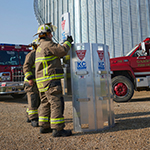Case study: 2011 Listeria outbreak
Take an in-depth look at the deadly Listeria outbreak and how it could have been prevented.
A farm in Colorado was identified as the origin of an outbreak that killed 33 people and hospitalized 147 others across 28 states in the U.S.
Given the microbial world in which we live, there are many opportunities – from production to preparation – for food to become contaminated. Since foodborne diseases are largely preventable, ensuring food safety in the initial stages of production is highly important and requires major efforts on the part of farms, production plants and other handlers during the various stages of the production process.
The following case study delivers a powerful message on the importance of food safety and the level of impact that food contamination and foodborne illnesses can have on an industry and public health.
A foodborne illness outbreak case study
In 2011, a widespread outbreak of listeriosis occurred in the U.S. affecting a total of 28 states. The investigation determined the outbreak originated from a farm located in Colorado, and was the result of contaminated cantaloupes that had been improperly washed. The outbreak resulted in a total of 33 deaths and 147 hospitalizations. It was the worst foodborne illness outbreak in the U.S. since the listeria outbreak that occurred in 1985 resulting from contaminated cheese.
Because the bacteria wasn’t found in the farm's soil surrounding the processing plant, investigators never determined the original source of the bacteria, nor how it ended up in the processing plant. The investigation found listeria on the farm’s equipment, which had been bought “used” from a supplier and previously used to wash potatoes. The Colorado farm neglected to use a chlorine spray that could have greatly cut down bacteria that contributed to the contamination.
Contaminated water was also found on the plant floor, which allowed the bacteria to spread as a result of employee movement, as indicated by the presence of contaminated water on the cantaloupe conveyor belt.
Finally, contributing to the outbreak was the farm’s use of a food safety auditor who inspected the farm and its products prior to shipment, but failed to notice the listeria bacteria. The farm passed a food safety audit six days prior to the outbreak. That company subcontracted the auditing work to another company. Three thousand cases of cantaloupes were recalled.
Survivors and families of those deceased settled with Jensen Farms, the food safety auditor and an equipment company for a total of $4.5 million. Lawsuits alleged that the farm did not adopt adequate procedures to ensure clean conditions for processing the produce. Jensen Farms and the food safety auditor filed for bankruptcy.
Risk Management recommendations to help avoid similar outbreaks
- Consider larger insurance limits and umbrellas. Jensen Farms had insurance policies with limits totaling only $2 million.
- Ensure all vendors, food safety auditors and their subcontractors are insured and licensed and will stand by their product or service.
- Ensure all food is manufactured "Food Safe" (or unadulterated).
- Take total responsibility in protecting your product and name brand from any product contamination (unintentional or intentional).

 >
>

 >
>
 >
>